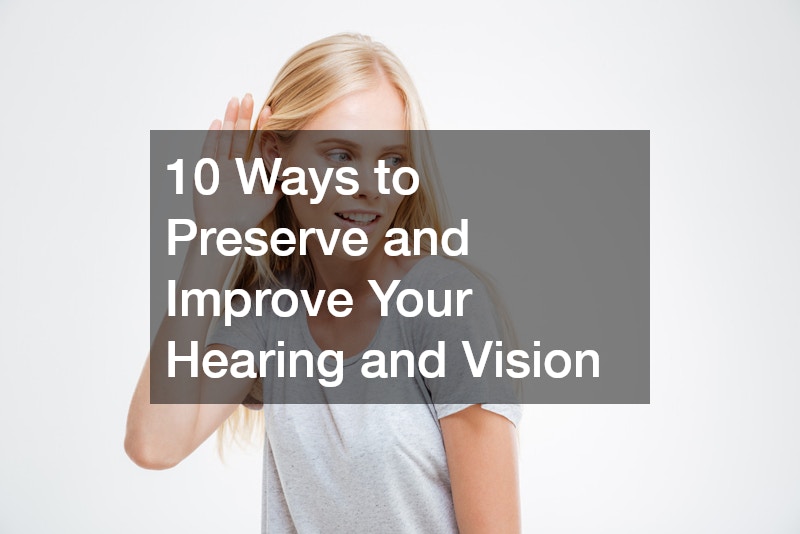
In our fast-paced, modern world, maintaining good hearing and vision is crucial for overall well-being and quality of life. Eyesight and hearing are not just essential for enjoying life’s experiences, but they also play a vital role in our communication, work, and leisure activities. Whether it’s listening to a loved one’s voice or reading a favorite book, our senses facilitate our connection with the world around us.
As we age, both hearing and vision can deteriorate, impacting our day-to-day lives significantly. Thus, proactive steps are necessary to preserve and enhance these vital senses. Early recognition of problems and timely interventions can make a considerable difference. In this article, we will explore 10 effective ways to ensure your hearing and vision remain sharp and healthy, ranging from dietary adjustments to protective measures and technological aids.
By following these valuable tips, you can maintain or even improve your hearing and vision, enhancing your quality of life. From regular check-ups with an audiologist to using designer prescription glasses, each step plays a vital role in preserving these senses. Join us as we delve into these strategies and learn how to take better care of your eye and ear health. Additionally, we’ll discuss the importance of lifestyle choices, such as managing screen time and avoiding excessive noise exposure, as well as incorporating simple daily habits that support long-term sensory health. By adopting these practices, you can safeguard your hearing and vision, ensuring that you continue to fully engage with and enjoy the world around you for years to come.
1. Notice Early Signs of Hearing Loss

Recognizing the early signs of hearing loss is crucial for preserving your hearing health. Symptoms such as frequently asking people to repeat themselves, increasing the volume on electronic devices, or having difficulty understanding conversations in noisy environments are red flags. Paying attention to these signs allows you to seek immediate medical care from an audiologist. It’s very easy to take your hearing for granted and ignore these signs. You may believe that you’re simply being dramatic, but don’t hesitate to reach out to ear health specialists if you notice any of these signs.
An audiologist is one ear health specialist who can help you. They can perform comprehensive tests to determine the extent of hearing loss and recommend suitable treatment options. Early intervention can make a significant difference, potentially restoring partial or full hearing and improving your overall quality of life. Ensure regular check-ups with an audiologist to monitor and manage your hearing health effectively.
Additionally, adopting preventive measures against potential causes of hearing loss can be beneficial. For instance, wearing protective earmuffs in noisy environments or avoiding prolonged exposure to loud music can help safeguard your hearing. Don’t underestimate the effectiveness of protective or avoidant measures. Proactively addressing these early signs can keep your hearing health in optimal condition.
2. Detect Vision Problems Early
Just like hearing, early detection of vision problems is essential. Changes in vision, such as difficulty reading, frequent headaches, or straining to see distant objects, should not be ignored. Seeking immediate medical care from an eye specialist can help diagnose and address these issues promptly. Trust us, you’ll certainly be happier in the end if you reach out sooner rather than later.
Regular eye exams are vital for detecting vision problems early. An eye specialist can identify conditions like glaucoma, cataracts, or macular degeneration, which can be managed or treated effectively if caught in time. Using designer prescription glasses, recommended by a specialist, can correct vision issues and alleviate strain on your eyes.
Understanding and reacting to early signs of vision problems can prevent further deterioration. Using proper eyewear not only enhances your vision but also protects your eyes from harmful UV rays and digital screens. Maintaining good vision health is integral to preserving your overall health.
3. Ingest Essential Nutrients for Eye Health
Your diet significantly impacts your eye health. Consuming foods rich in essential nutrients like vitamin A, C, E, and omega-3 fatty acids can support and preserve your vision. These vitamins are found in a variety of fruits, vegetables, and fish, providing a natural way to maintain eye health.
Incorporating leafy greens, citrus fruits, nuts, and fish into your diet can help combat age-related eye conditions like macular degeneration and cataracts. Maintaining a balanced diet ensures that your eyes receive the necessary nutrients for optimal performance. Using a combination of proper diet and designer prescription glasses can enhance and protect your vision.
Consulting with a healthcare provider can help create a diet plan tailored to your needs, specifically targeting eye health. Coupled with regular eye exams and appropriate eyewear, these dietary changes can significantly benefit your eye health. Adopting these dietary habits is a proactive way to preserve your vision for the long term.
4. Protect Your Ears From Noise Damage

Noise-induced hearing loss is a prevalent yet preventable condition. Regular exposure to high decibel levels in environments like concerts, construction sites, or even prolonged use of headphones can damage your hearing. Taking steps to protect your ears is crucial to maintaining good hearing health.
Using ear protectors, such as earplugs or earmuffs, in noisy environments can significantly reduce the risk of hearing damage. Ensuring that the volume of personal audio devices is kept at a safe level also helps protect your hearing. Regular check-ups at local physical therapy rehabs can provide further guidance and support in preventing noise-induced damage.
Implementing these protective measures can safeguard your hearing. Being mindful of your listening habits and taking proactive steps to protect your ears will contribute to the preservation of your ears. Proper ear protection is an essential strategy in maintaining long-term hearing health.
5. Consider the Role Hydration Plays in Eye and Ear Health
Staying hydrated is vital for overall health, including the health of your eyes and ears. Adequate hydration helps maintain the moisture in your eyes, preventing dryness and irritation. Drinking plenty of water throughout the day can help ensure that your eyes remain lubricated and comfortable.
Similarly, inner ear functions rely on proper fluid balance to transmit sound waves effectively. Dehydration can affect ear function and potentially lead to issues with hearing. Integrating sufficient water intake into your daily routine supports the health of your entire auditory system, keeping your eyes and ears functioning at their best.
Furthermore, sipping water regularly can also alleviate symptoms associated with digital eye strain. Proper hydration, combined with the use of appropriate eyewear like glasses or contact lenses, can significantly enhance eye comfort and health. Prioritizing hydration is a simple yet effective way to maintain optimal vision and hearing health.
6. Manage Digital Eye Strain
Prolonged exposure to digital screens can cause digital eye strain, manifesting as discomfort, headaches, and dry eyes. In today’s digital age, managing screen time is crucial to preserving eye health. Adopting the 20-20-20 rule, which involves taking a 20-second break to look at something 20 feet away every 20 minutes, can reduce eye strain significantly.
Using glasses designed for screen use can also help in reducing digital eye strain. These glasses often feature a blue light filter that minimizes the harmful effects of screen exposure. Additionally, adjusting the brightness and contrast settings on your devices to comfortable levels can ease the strain on your eyes.
Creating an ergonomic workspace with proper lighting and screen positioning also contributes to reduced eye strain. Implementing these strategies can protect your vision and enhance your eyesight even further, even in a technology-driven world. Managing digital eye strain is essential for maintaining long-term eye health.
7. Look Into Common Hearing Aids and Their Benefits

For those experiencing hearing loss, hearing aids are a valuable solution. These devices amplify sound, making it easier to hear and communicate effectively. There are numerous types of hearing aids available, each designed to cater to specific needs and levels of hearing loss.
Consulting with an audiologist can help determine the best hearing aids for your requirements. BTE (behind-the-ear), ITE (in-the-ear), and ITC (in-the-canal) are some of the various styles available. Each type has its unique features and benefits, providing a tailored solution to improve your hearing ability. Working with hearing services can ensure you make an informed choice that best suits your needs.
Modern hearing aids come with advanced features like noise reduction, directional microphones, and wireless connectivity. These features enhance the user’s experience, making daily communication more manageable and enjoyable. Exploring and using the best hearing aids can dramatically improve your quality of life and overall contentment.
8. Perform Eye Exercises for Better Vision
Eye exercises can help improve vision and reduce strain. Simple routines like focusing on a distant object, rolling your eyes, or practicing near and far focus exercises can enhance eye strength and flexibility. Incorporating these exercises into your daily routine can lead to better eye health.
Regular performance of eye exercises can also help alleviate issues related to digital eye strain. For example, the 20-20-20 rule involves taking breaks to focus on distant objects, which can refresh and relax your eyes. Guided routines offered by professionals at local physical therapy rehabs can provide additional benefits and support.
Additionally, consulting with your local plastic surgeon or eye specialist can provide personalized advice on effective eye exercises. These exercises are a proactive way to maintain and even enhance your eyesight. Regular practice can lead to long-term improvements in vision health.
9. Think About the Effects of Smoking on Hearing and Vision
Smoking has well-documented harmful effects on overall health, including significant impacts on hearing and vision. The toxins in cigarette smoke can damage the delicate structures in the ear, leading to hearing loss over time. Quitting smoking can help preserve your auditory health and prevent further damage.
Similarly, smoking contributes to the development of various eye conditions, such as cataracts, macular degeneration, and dry eye syndrome. These conditions can significantly impair vision and reduce the quality of life. Seeking immediate medical care to address these issues early on is crucial for maintaining good eye health.
Quitting smoking is a vital step towards preserving your eyesight and hearing. Leveraging support from healthcare providers, smoking cessation programs, and emergency clinics can facilitate the process. Removing this harmful habit from your life can lead to better hearing, vision, and overall health.
10. Use Assistive Technologies for Hearing and Vision

Technology plays a significant role in supporting those with hearing and vision impairments. Assistive devices such as hearing aids, cochlear implants, and amplified telephones enhance hearing capabilities. Consulting with hearing services can help you find the right technology to suit your needs.
For vision impairments, tools like magnifiers, screen readers, and specially designed eyewear can improve daily living. Using designer prescription glasses tailored to your vision requirements can enhance clarity and reduce strain. These technologies make it easier to perform routine tasks and maintain independence.
Exploring and utilizing assistive technologies can significantly improve your quality of life. Working with specialists and healthcare providers to find the appropriate tools ensures that your eyesight and hearing remain as effective as possible. Embracing these advancements in technology can lead to better hearing and vision health.
Maintaining good hearing and vision is essential for a high-quality life. Recognizing early signs of trouble and seeking immediate medical care can make a substantial difference. Employing strategies such as proper nutrition, protective measures, and using assistive technologies ensures your senses remain sharp and effective.
Incorporating these tips into your daily routine promotes long-term health and well-being. By being proactive, you can preserve and enhance your hearing and vision, leading to a more fulfilling and engaged life. Prioritize your senses and take the necessary steps to protect and improve them. Additionally, staying informed about the latest advancements in eye and ear care can help you make better decisions regarding your health. Regularly updating your knowledge and adapting your practices to new insights can further safeguard your sensory health. Remember, your hearing and vision are invaluable assets—investing time and effort into preserving them will pay off in the long run, allowing you to continue enjoying the richness of the world around you.



